Old Testament
Genesis Exodus Leviticus Numbers Deuteronomy Joshua Judges Ruth 1 Samuel 2 Samuel 1 Kings 2 Kings 1 Chronicles 2 Chronicles Ezra Nehemiah Esther Job Psalms Proverbs Ecclesiastes Song of Solomon Isaiah Jeremiah Lamentations Ezekiel Daniel Hosea Joel Amos Obadiah Jonah Micah Nahum Habakkuk Zephaniah Haggai Zechariah MalachiJoel 1:9 Similar Verses
Joel 1:9 Cross References
The meat offering and the drink offering is cut off from the house of the LORD; the priests, the LORD's ministers, mourn.
Uncover the Rich Themes and Topics of This Bible Verse
Listed below are the Bible themes associated with Joel 1:9. We invite you to explore each theme to gain deeper insights into the Scriptures.
Joel 1:9 Cross Reference Verses
This section features a detailed cross-reference designed to enrich your understanding of the Scriptures. Below, you will find carefully selected verses that echo the themes and teachings related to Joel 1:9 KJV. Click on any image to explore detailed analyses of related Bible verses and uncover deeper theological insights.
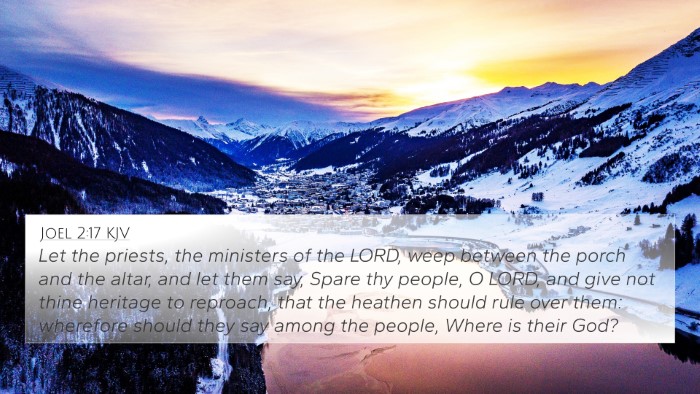
Joel 2:17 (KJV) »
Let the priests, the ministers of the LORD, weep between the porch and the altar, and let them say, Spare thy people, O LORD, and give not thine heritage to reproach, that the heathen should rule over them: wherefore should they say among the people, Where is their God?
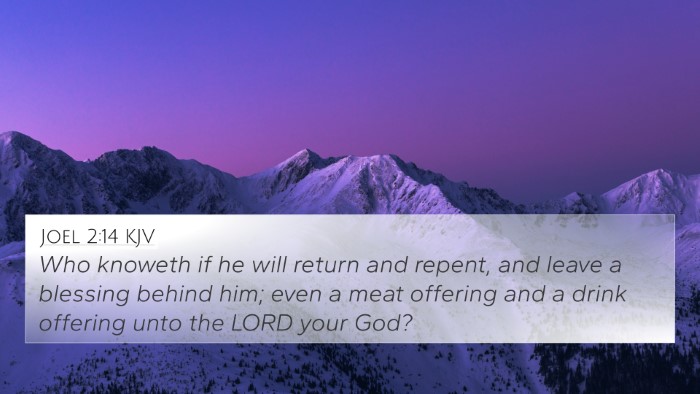
Joel 2:14 (KJV) »
Who knoweth if he will return and repent, and leave a blessing behind him; even a meat offering and a drink offering unto the LORD your God?
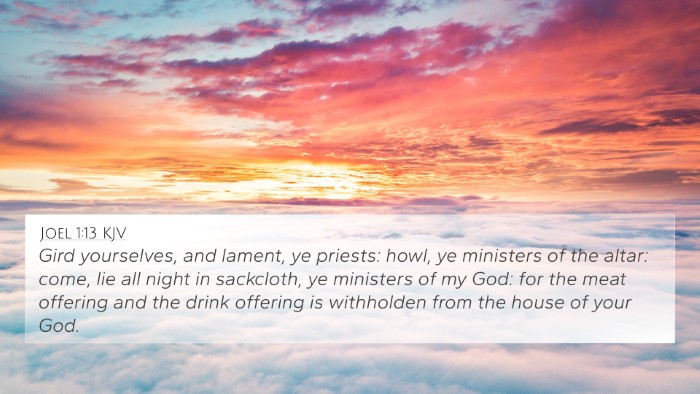
Joel 1:13 (KJV) »
Gird yourselves, and lament, ye priests: howl, ye ministers of the altar: come, lie all night in sackcloth, ye ministers of my God: for the meat offering and the drink offering is withholden from the house of your God.
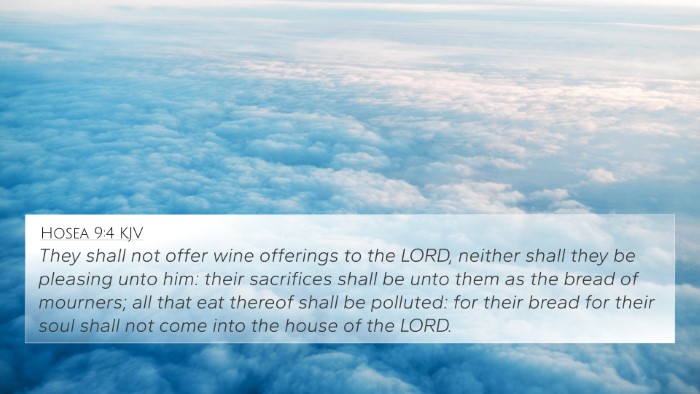
Hosea 9:4 (KJV) »
They shall not offer wine offerings to the LORD, neither shall they be pleasing unto him: their sacrifices shall be unto them as the bread of mourners; all that eat thereof shall be polluted: for their bread for their soul shall not come into the house of the LORD.
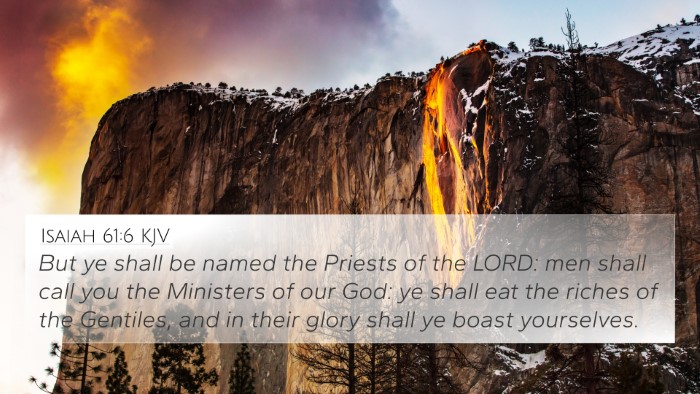
Isaiah 61:6 (KJV) »
But ye shall be named the Priests of the LORD: men shall call you the Ministers of our God: ye shall eat the riches of the Gentiles, and in their glory shall ye boast yourselves.
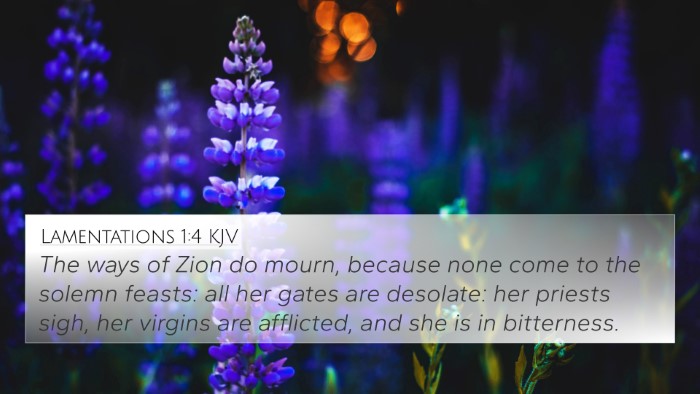
Lamentations 1:4 (KJV) »
The ways of Zion do mourn, because none come to the solemn feasts: all her gates are desolate: her priests sigh, her virgins are afflicted, and she is in bitterness.
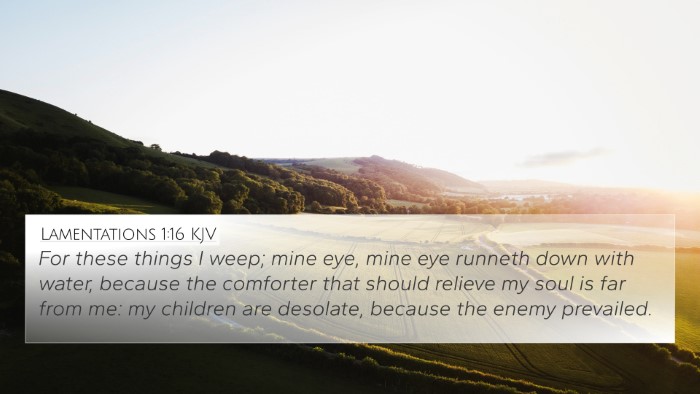
Lamentations 1:16 (KJV) »
For these things I weep; mine eye, mine eye runneth down with water, because the comforter that should relieve my soul is far from me: my children are desolate, because the enemy prevailed.
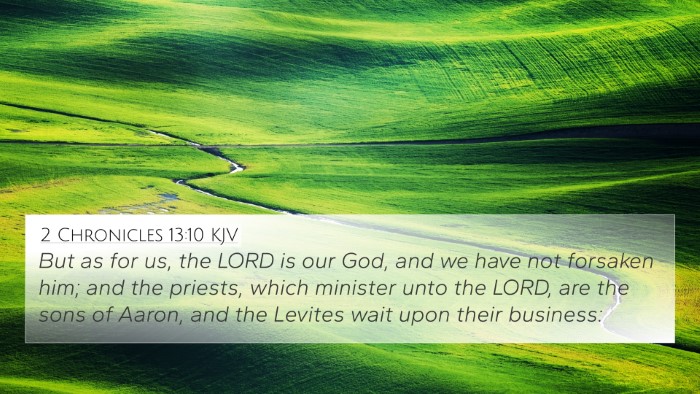
2 Chronicles 13:10 (KJV) »
But as for us, the LORD is our God, and we have not forsaken him; and the priests, which minister unto the LORD, are the sons of Aaron, and the Levites wait upon their business:
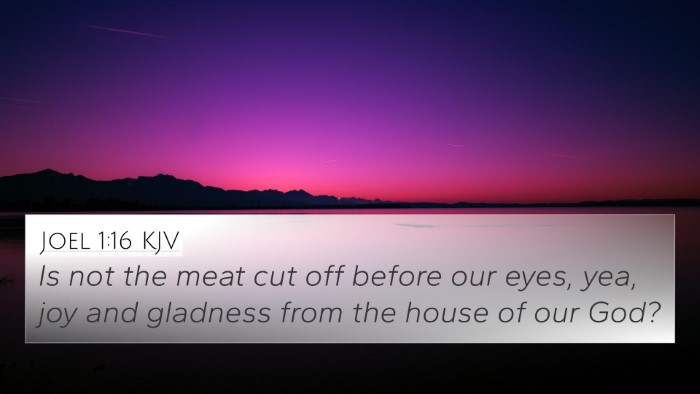
Joel 1:16 (KJV) »
Is not the meat cut off before our eyes, yea, joy and gladness from the house of our God?
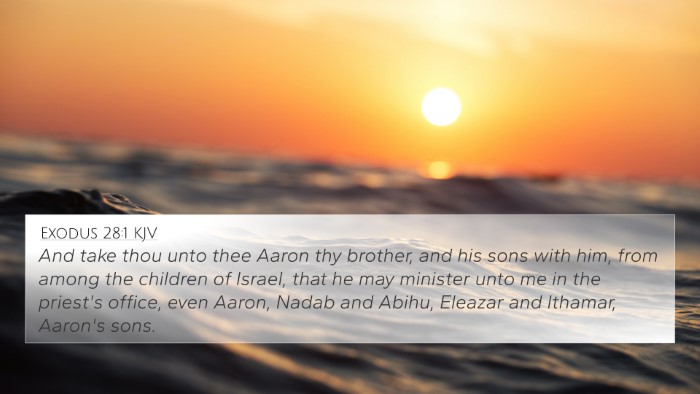
Exodus 28:1 (KJV) »
And take thou unto thee Aaron thy brother, and his sons with him, from among the children of Israel, that he may minister unto me in the priest's office, even Aaron, Nadab and Abihu, Eleazar and Ithamar, Aaron's sons.
Joel 1:9 Verse Analysis and Similar Verses
Meaning and Interpretation of Joel 1:9
Joel 1:9 reads: "The meat offering and the drink offering is cut off from the house of the Lord; the priests, the Lord's ministers, mourn." This verse captures a moment of lamentation over the cessation of offerings in the Temple, symbolizing dire spiritual and social conditions.
Contextual Overview
The Book of Joel addresses a locust plague devastating Judah, serving both as a warning and a call to repentance. This verse specifically deals with the implications of the plague on worship and community practices, crucial for understanding ancient Israelite life.
Insights from Commentaries
-
Matthew Henry:
Henry emphasizes the spiritual desolation reflected in the absence of offerings. He points out that these offerings were vital for the sustenance of the community's relationship with God, and their loss signifies a rupture in divine connection and worship.
-
Albert Barnes:
Barnes interprets the term "cut off" as indicative of a complete cessation, delineating the gravity of the situation. He states that the priests’ mourning indicates a profound grief over the dishonor brought upon God, as the regular sacrifices were pivotal to maintaining both national identity and divine favor.
-
Adam Clarke:
Clarke provides an analytical view of the priesthood's role during this time. He notes that the priests, as mediators, experience deep sorrow due to their inability to perform their sacred duties, linking this sadness to the broader theme of loss of religious observance in Judah.
Theological Implications
The absence of offerings symbolizes a deeper spiritual decay. As worship was central to the Israelite life, the interruption of these rites manifests a collective turning away from God. This verse underlines the importance of ritual and communal worship in maintaining God’s presence among His people.
Cross-References to Joel 1:9
This verse connects with various other biblical texts that highlight the theme of worship, offerings, and spiritual desolation:
- Amos 5:21-24: God expresses disdain for empty rituals devoid of justice.
- Isaiah 1:11-15: The Lord disapproves of sacrifices that lack true repentance.
- Malachi 1:10: God seeks heartfelt worship rather than mere ritual observance.
- Psalm 51:16-17: The desire for a contrite heart over formal sacrifices highlights true worship.
- Hosea 6:6: Emphasizes that God desires mercy, not sacrifice, pointing to true relationship over ritual.
- Leviticus 26:31: Declares the consequences of disobedience, including the cessation of offerings.
- Exodus 29:38-42: Discusses the importance of continual offerings in the priestly service.
- Jeremiah 14:12: A portrayal of ritual loss reflecting deeper spiritual dysfunction amidst drought.
- Numbers 28:2-3: Outlines the essential nature of offerings as part of community worship.
- Romans 12:1: Paul calls believers to present their bodies as living sacrifices, indicating a shift from ritual to life application.
Applications for Today
Joel 1:9 serves as a powerful reminder of the value of sincere worship. Believers today can reflect on their spiritual lives, assessing the authenticity of their offerings to God—whether as acts of service, worship, or faithfulness. The verse also invites individuals to consider how community worship impacts collective spirituality.
Conclusion
In understanding Joel 1:9, we see the profound implications of spiritual barrenness brought about by neglect of worship. Through church history and personal application, the call remains for believers to reconnect with the principles highlighted in this verse: the necessity of authentic worship, the importance of community in faith practices, and the need for spiritual renewal.


